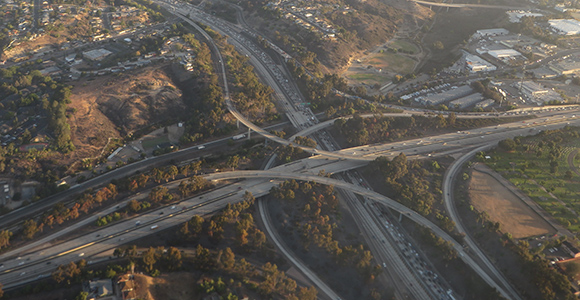
(Photo Credit: Ken Lund/Flickr)
Most of the attention in the special legislative session tasked with finding money for transportation infrastructure has focused on how state agencies (Caltrans) and local governments (cities and counties) could use new funding streams to repair local roads and state highways. With existing revenues (exhibit A: the gas tax) failing to keep pace with transportation needs—and with the state facing a $59 billion backlog in deferred road maintenance—a coalition of business and labor groups released a set of ideas this week for increasing user fees and gas taxes to produce $6 billion in new revenue annually for the state’s roads.
These are big numbers—so big they make it easy to focus only on the dollar signs. But the special session shouldn’t overlook another, equally important element of a lasting transportation funding solution: the enormous potential for making investments at the regional scale, not just by raising new state taxes, but by fostering collaboration across California’s diverse regional economies and providing taxpayers with confidence they will improve results.
Fixing the state’s roads will take more than money, in other words. It will also take better governance.
This is the message of a letter released today by the co-leads of the California Economic Summit’s Infrastructure action team, which details two opportunities in the special session to improve how transportation funds are managed by creating more robust regional financing authorities and by expanding the scope of the state’s new Enhanced Infrastructure Financing Districts (EIFDs) to invest in state roads and highways, railroads, and ports.
“As a champion of sustainable regional economic growth, the California Economic Summit supports the Legislature’s efforts in the new special session to increase resources for transportation projects,” said Mark Pisano, a senior fellow at the USC Sol Price School of Public Policy, and Sean Randolph, senior director of the Bay Area Council Economic Institute. “Investments in roads, highways, and transit—made across the state’s regional economies with the goal of simultaneously growing the economy, improving environmental quality, and increasing opportunity for all—are vital to the state’s long-term prosperity.”
The Summit letter highlights the possibilities of pairing new revenues with governance changes that will allow more communities to support the regional transportation projects they need.
Many of these ideas have emerged from California Forward’s Financing the Future series, which has been exploring fiscal solutions that can allow California to meet the infrastructure needs of its diverse regions. These reports have detailed a range of options for integrating funding sources and fiscal incentives with governance changes—all aimed at providing communities with more flexibility to take on the state’s funding challenges themselves. CA Fwd presented some of the ideas to lawmakers in June.
The new Summit letter gets more specific, highlighting two ideas that could be considered in the special session to allow California communities to address the state’s transportation needs. They include:
- Creating additional regional financing authorities authorized to build and maintain transportation and goods movement projects—and to enter into public-private partnerships to fund these projects, conduct environmental analysis on a regional scale, and tap new user-generated revenue streams to support the investments.
- Expanding the authority of new Enhanced Infrastructure Financing Districts (EIFDs) to invest in state roads and highways, railroads, and ports. While state law prohibits this type of investment today, lawmakers should reconsider these restrictions—and allow more communities to use EIFDs to support road and goods movement projects by tapping local resources and revenues generated from the increasing value of the land.
For details, read the Summit letter here.

